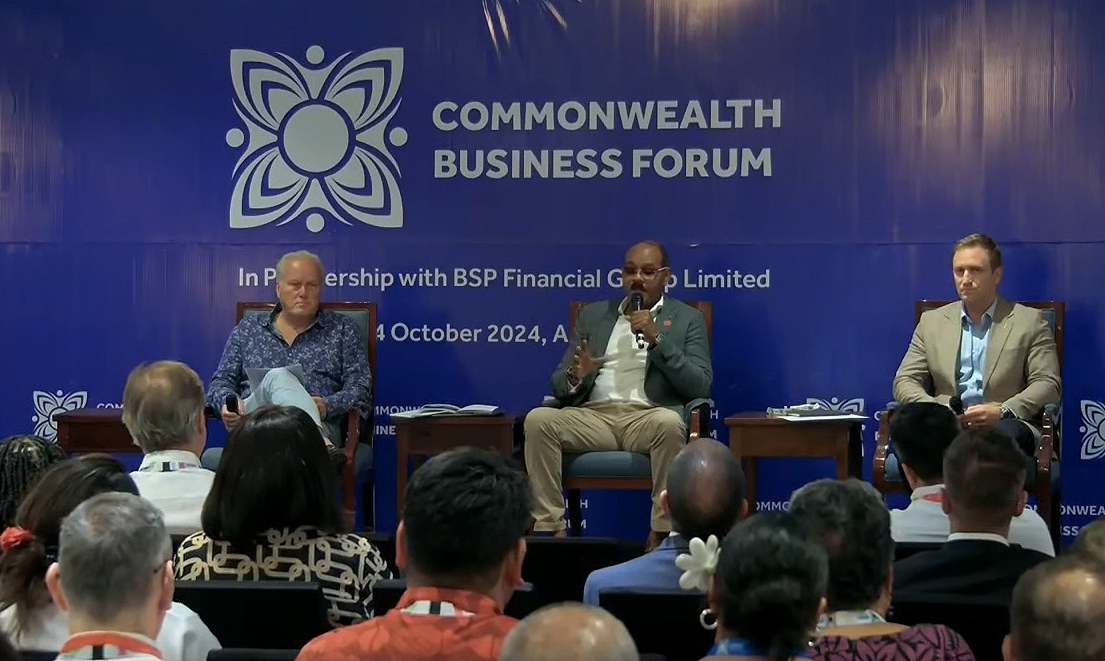 October 2024: Antigua & Barbuda Prime Minister Gaston Browne at the Commonwealth Business Forum in Samoa. Antigua will host the 2026 CHOGM. [photo: CEIC YouTube]
October 2024: Antigua & Barbuda Prime Minister Gaston Browne at the Commonwealth Business Forum in Samoa. Antigua will host the 2026 CHOGM. [photo: CEIC YouTube]
[This is an article from The Round Table: The Commonwealth Journal of International Affairs and Policy Studies.]
The biennial Commonwealth Heads of Government Meeting (CHOGM) seldom receives plaudits. In 1987, when the Commonwealth was at the height of its influence, the Sydney Morning Herald derided it as a forum where countries which have no chance to stride the world stage and shape events ‘can play at it’.
Four decades on, in October 2024 in Samoa, CHOGM proved its continuing relevance. With climate change now the greatest existential challenge of our age, and small island states facing the very real threat of disappearing under the ravages of sea-level rise and cyclones, it mattered that it was hosted by a small island developing state.
CHOGM came through with a historic Ocean Declaration and consensus language on climate change, signed up to by 56 nations from Australia through India to Zambia. This will play a powerful role at the Climate Change COP29 negotiations in Azerbaijan in November.
The role of civil society has never been stronger. The importance of the People’s Forum, Youth Forum, Women’s Forum, and Business Forum and other side events has grown over the years. It is to Samoa’s credit that it was determined to hold these Forums despite its limited accommodation resources. Never have the organisation, exchanges (including with Ministers), and outcomes been better.
Civil society can take credit for the adoption by Heads of a key outcomes document, ‘The Commonwealth Principles on Freedom of Expression and the Role of the Media in Good Governance’, drafted over the years by the Commonwealth Human Rights Initiative, Commonwealth Journalists’ Association, Commonwealth Lawyers’ Association and others. At a time when freedom of expression and the media are under great threat, the document demonstrated an important commitment to Commonwealth values.
Another key outcome was the agreed language on a process for reparative justice for the historic evils and impact of slavery. This will be a complex conversation to take forward to the next CHOGM in Antigua and Barbuda in 2026. The fact that the British Prime Minister and other leaders were prepared to begin the conversation was an outstanding example of the Commonwealth spirit in action.
King Charles III, in his first speech as Head of the Commonwealth at the Opening Ceremony, set the mood perfectly with his comment that ‘None of us can change the past. But we can commit, with all our hearts, to learning its lessons and to find creative ways to right inequalities that endure’. A deeply conflicted world would do well to follow the Commonwealth example.
Letters from Apia – Matthew Neuhaus’s articles from Samoa
The Samoa CHOGM and reflections on the Commonwealth
The Samoa CHOGM: What does it mean?
The Samoan hosts did a remarkable job within their limited resources. The programme was well organised and the cultural events stunning. Prime Minister Fiame’s leadership and engagement, from hosting civil society meetings to chairing the Leaders’ retreat, was committed, warm and masterful. The whole nation joined in the event, with villages adopting Commonwealth countries and repainting them in ‘their’ country’s colours.
The turnout of Heads at around 20 was relatively low, not helped by a competing BRICS meeting in Russia, which took away the leaders of South Africa, India, Nigeria and Uganda. But almost all member nations were represented at senior ministerial level and the smaller countries had a genuine opportunity for their concerns to be heard.
Australia and New Zealand strongly supported Samoa with the hosting, with their leaders in attendance along with Prime Minister Keir Starmer from the UK. Australia won Commonwealth endorsement to hold the Climate Change COP with the Pacific in 2026. Of the old Commonwealth only Canada, in political crisis at home, was missing.
One striking omission from the discussion and the Communiqué was Zimbabwe. The release to governments of the Commonwealth Observer Group Report on the 2023 elections just two weeks before CHOGM meant there was no time for consideration and substantive response, especially given continuing issues of concern. Even Zimbabwe seemed ambivalent, with negative noises from Harare. One suspects there is still some time to run on this issue, even if the incumbent Commonwealth Secretary-General, who had a good final CHOGM, would have liked to resolve it.
A capable new Secretary General in Ghana’s Foreign Minister, Shirley Botchwey, was elected with broad support; the next venue in Antigua and Barbuda has been locked in; and a substantive agenda is set out in the Communiqué. It will be important now for Botchwey to put in place a reform process and secure the resources the Secretariat badly needs for its future.
Samoa’s able hosting and chairing is likely to be replicated by Antigua and Barbuda, putting the Commonwealth’s future now very much in the hands of small island developing states leadership. With the support of the Commonwealth, they are able perform a substantial role on the world stage, not just play at it. This matters for all our futures.
Matthew Neuhaus is the Hon Professor, ANU College of Law, President of the Australian Royal Commonwealth Society and a member of the Round Table’s international advisory board.



